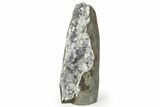This Specimen has been sold.
6.8" Amethyst and Chabazite Crystals on Sparkling Chalcedony - India
This is a beautiful, 6.8" wide specimen that features an association of quart, amethyst, and chabazite crystals, all formed from a sparkling chalcedony encrusted matrix, collected from Madhya Pradesh, India. This formation occurred within a cavity/vug in the basalt host rock. Apophyllite, barite, and julgoldite crystals have also been reported as being present within some of these vugs.
The base of this specimen has been cut flat for presentation.
The base of this specimen has been cut flat for presentation.
About Amethyst
Amethyst is a purple variety of quartz (SiO2) that owes its violet color to natural gamma irradiation, iron impurities, and the presence of trace elements, which result in complex crystal lattice substitutions. It is considered a semi-precious gemstone, and just two centuries ago was considered to have a value on par with diamonds, sapphires, and rubies. The largest and best known amethyst deposits occur in southern Brazil and Uruguay, where they are found in hydrothermally-formed geodes, but many localities around the world produce an amazing variety of amethyst crystals and formations. They are almost always formed in medium- to high-temperature geological settings.
Amethyst is a purple variety of quartz (SiO2) that owes its violet color to natural gamma irradiation, iron impurities, and the presence of trace elements, which result in complex crystal lattice substitutions. It is considered a semi-precious gemstone, and just two centuries ago was considered to have a value on par with diamonds, sapphires, and rubies. The largest and best known amethyst deposits occur in southern Brazil and Uruguay, where they are found in hydrothermally-formed geodes, but many localities around the world produce an amazing variety of amethyst crystals and formations. They are almost always formed in medium- to high-temperature geological settings.
About Chabazite
Chabazite is an eye-catching mineral from the zeolite group, admired for its beautifully symmetrical crystal structure and pastel colors. Typically forming in rhombohedral or cubic-like crystals, chabazite often appears in hues of white, pink, orange, or light yellow. This mineral is primarily composed of hydrated calcium aluminum silicate, giving it a lightweight, porous structure that enables it to act as a natural ion-exchanger—a property commonly seen in zeolites.
Chabazite crystals have a vitreous to pearly luster, and their transparent to translucent appearance gives them an almost delicate, ethereal quality. With a hardness of about 4.5 to 5 on the Mohs scale, chabazite is moderately soft, making it suitable for display rather than wear. It typically forms in cavities within volcanic rocks like basalt and andesite, where it grows alongside other zeolite minerals such as heulandite, stilbite, and analcime. Some of the finest chabazite specimens come from Iceland, Italy, and India, renowned for their vivid color and well-formed crystals.
Chabazite is an eye-catching mineral from the zeolite group, admired for its beautifully symmetrical crystal structure and pastel colors. Typically forming in rhombohedral or cubic-like crystals, chabazite often appears in hues of white, pink, orange, or light yellow. This mineral is primarily composed of hydrated calcium aluminum silicate, giving it a lightweight, porous structure that enables it to act as a natural ion-exchanger—a property commonly seen in zeolites.
Chabazite crystals have a vitreous to pearly luster, and their transparent to translucent appearance gives them an almost delicate, ethereal quality. With a hardness of about 4.5 to 5 on the Mohs scale, chabazite is moderately soft, making it suitable for display rather than wear. It typically forms in cavities within volcanic rocks like basalt and andesite, where it grows alongside other zeolite minerals such as heulandite, stilbite, and analcime. Some of the finest chabazite specimens come from Iceland, Italy, and India, renowned for their vivid color and well-formed crystals.
SPECIES
Quartz var. Amethyst, Quartz var. Chalcedony & Chabazite
LOCATION
Khadakwani, Madhya Pradesh, India
SIZE
6.8 x 2.6"
CATEGORY
SUB CATEGORY
ITEM
#220238
 Reviews
Reviews
















